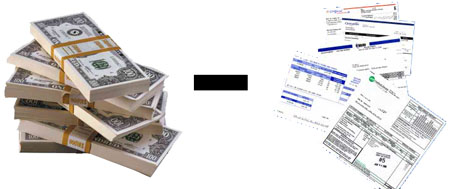The start of the year is a great time to set goals for the next year, but one thing that is important to do is report on the previous year and how you are doing overall. It’s not uncommon for businesses to do end of the year reporting for their shareholders, and in our household we also put together a financial report for our household and have a meeting to discuss. This accomplishes two things: it gives a time for EVERYONE to see the current financial situation (so they understand WHY we can’t afford that new fancy whatever), and also it lets you have a discussion about everyones goals and how realistically they can be achieved.
What should you look at? First, run some of the yearly reports in BudgetSimple. How did you do overall in meeting your budget each month? Were you consistently over budget? Next, you should calculate your current net worth. What is net worth? It’s essentially the value of everything you have, minus any debts (ie if you sold everything today, paid off debts, what would you be left with?).
To calculate net worth, add up all of your cash assets first: cash in Savings, Checking, Under The Mattress. Put this figure somewhere. Then add up your non-cash, non-retirement assets: Bonds, Mutual Funds, Stocks, cash value of insurance, etc.. Finally, look up the current value of your retirement, as well as the current estimated value of your home, car, and any other material items of significant value. This total amount is your ASSETS.
Now, add up all of your debt: credit cards, personal loans, student loans, etc.. And finally, also get the current amount owed on your mortgage. Add all of this up, and these are your LIABILITIES.
Once you subtract your liabilities from your assets, you have your net worth! Don’t be surprised if this number is negative, especially if you are young and just out of college with little or no home equity. I also like to break it out two net worth values, one with retirement and home equity, and one without. The reason I like to separate these is that home equity is at best a guess, and retirement you shouldn’t really be touching until you’re 65.
Here’s an example table:
| Type | Amount |
|---|---|
| Cash in Savings | 14000 |
| Cash in Checking | 800 |
| Total Cash: | 14800 |
| Mutual Fund Value | 22000 |
| Stocks Value | 7500 |
| Total Securities: | 29500 |
| Home Value | 180000 |
| Car Value | 7500 |
| Retirement | 120000 |
| Total Assets | 351800 |
| Type | Amount |
|---|---|
| Credit Cards | 4000 |
| Student Loan | 80000 |
| Car Loan | 10000 |
| Mortgage | 160000 |
| Total Liabilities | 254000 |
Net Worth: 351800 – 254000 = 97800
Save the number you get each year, discuss it with your family, and see how it increases or decreases year to year.

